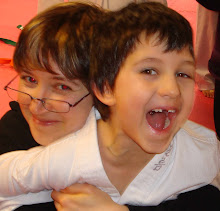Ultimately, I found a lot to appreciate about this story; Jeffrey Eugenides can write well, and creates vivid characters. The problem with Middlesex, for me, is that Eugenides is just a bit too heavy-handed with the way he tells the story. First, he grabs your interest on page one by introducing the narrator, Cal. Born Calliope Stephanides, Cal is a hermaphrodite (though I believe the term "intersexual" is becoming more commonly used) - he has both male and female sex characteristics. He was raised as a girl, but once puberty kicked in, things changed. This is an intriguing premise that made me eager to read on; but then, before I could find out much about Cal, warm to him as a character, I was suddenly presented with the story of his grandparents. Now I like to think of myself as an open-minded, accepting person, but I was pretty squicked out by the fact that Cal's grandparents were brother and sister. Ewww - Too Much Information! I didn't think this was at all necessary for the story. It's clear that there was so much intermarrying in their village back in Turkey that the genetic anomaly that led to Cal's predicament would certainly have been passed along through one or other of his ancestors. Anyway, reading about this incestuous relationship was pretty gross and distracted me from the story to the extent that I didn't have any feeling for the characters.
Yet, mindful of my need to be able to discuss this book intelligently with the other people in the book group, I read on. It turns out that this book is more a story of a Greek immigrant family in 20th-century Detroit than a story about a hermaphrodite. Cal's part in the story is reduced to occasional, jolting reminders of his narrative presence. I wish that I had been allowed to fully appreciate the experiences of Cal's grandparents and parents as they are related in the story, instead of having to see it all through Cal's not-very-believably-omniscient lens. Eugenides also has a tendency toward "information dump" which I found very annoying; he can go on for paragraphs or even for pages giving you information about this, that or the other historical event or demonstrating the research he did into sexual disorders. I often found myself feeling quite irritated at being distracted from the story by Cal's little "asides" and Eugenides' need to pad the story with unneeded detail.
Ultimately, Cal's story doesn't really start until Book Four, 401 pages into the novel. At this point, I found my mental editor thinking that this should have been the start of the book, when Cal's anatomical differences are finally revealed to him and to his family:
The Oracular Vulva
From my birth when they went undetected, to my baptism where they upstaged the priest, to my troubled adolescence when they didn't do much of anything and then did everything at once, my genitals have been the most significant thing that ever happened to me. Some people inherit houses; others paintings or highly insured violin bows. Still others get a Japanese tansu or a famous name. I got a recessive gene in my fifth chromosome and some very rare family jewels indeed.
From here, Cal's experiences become the focus of the story; we find out what it's like for him to learn to live with a new definition of himself after fourteen years of believing he is a girl. Now that is what I wanted all along - why did Eugenides string me along for 400 pages before he got to it? It's definitely hard to get "sucked in" to a good book when I'm constantly revising the manuscript in my head, thinking of a better way the story could have been presented to me.
At any rate, I'm glad I stuck with this novel, because I'll have a lot more to say at the book group meeting; but I'm very sorry that so much of what I have to say is negative. Book Four, the last section of the book, was great and I was sad that Eugenides held out on giving his readers the full benefit of his writing abilities until 400 pages in.
P.S. I just noticed that the last time I actually finished a book was April 4! This has got to be a record for me. I blame my final exams for first taking up all my potential reading time with studying, and then frying my brain to the point where I couldn't string two thoughts together for several days... No wonder there is such a backlog on that bookshelf of mine. Time to go waste a few perfectly good weeks inhaling some (hopefully) good books.

No comments:
Post a Comment